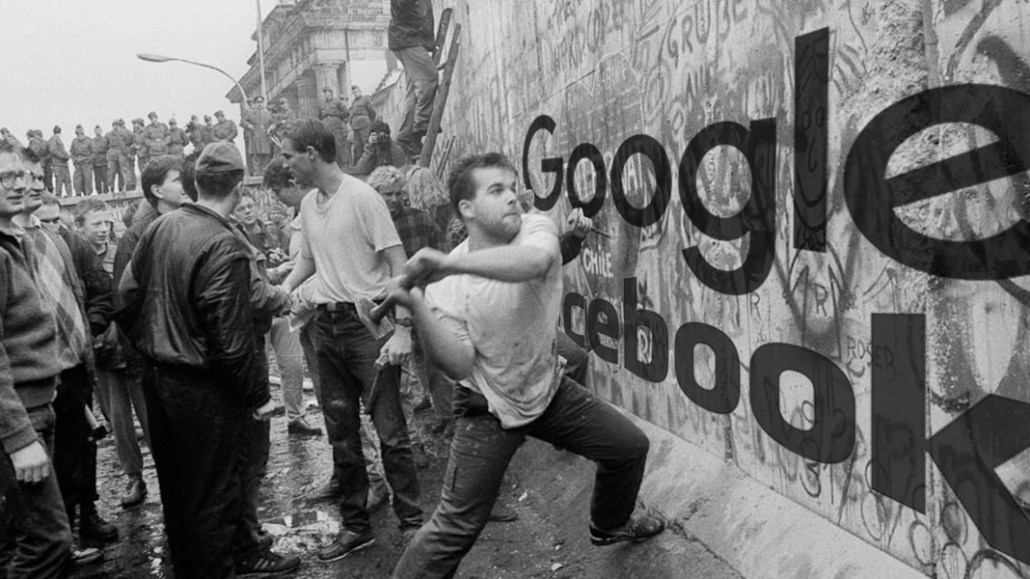Secure your place at the Digiday Media Buying Summit in Nashville, March 2-4
With an eye on the duopoly, German broadcasters create a unified consumer login

Broadcasters have become the latest media companies in Germany to challenge the market dominance of tech giants Google, Facebook and Amazon.
Two of the country’s biggest broadcasters, RTL Group and ProSiebenSat.1 Media SE, have formed an alliance with an ISP called United Internet to create a unified registration and login service for consumers. The point is to make it easier for people to control what data media and advertising businesses have from them — the rules around which will be much stricter after new European data privacy laws (General Data Protection Regulation) kick in next May. Berlin-based fashion e-commerce giant Zalando has also signed up to join the service.
The founding partners reach a combined 45 million monthly unique users, according to Germany’s online federation of marketers AGOF. Their registered users will be able to create a single ID and use the same details to log in across all four aforementioned sites (and any other company that signs up to be part of the synchronized login), and they can manage all their own settings via a unified data privacy center. That means every time a person visits a site across any of the media company’s online portfolios, they’ll be able to login with the same details or stay logged in.
The consensus among media outlets across Europe is that the new data privacy laws will be advantageous to walled gardens like Amazon, Facebook and Google, but also Apple and Microsoft, which have massive amounts of login data from users across devices. In theory, it’ll be easier for those tech giants to communicate new data-tracking consent requirements than it would any publisher or commerce business that doesn’t have mass logged-in or registered audiences.
“With our alliance, we are adding substantial value for the customer,” said Thomas Ebeling, CEO of ProSiebenSat.1 Media SE, in a statement announcing the partnership. “At the same time, we are strengthening the German digital market by counterbalancing the monopolistic and unclear algorithms used by U.S. players.”
Mixed history
Publisher alliances have a checkered past, though. In theory, by combining audience data, resources and inventory, premium publishers can better compete for digital ad revenue with the likes of Google and Facebook. But disparate business models and ways of tracking user data, along with internal bureaucracy and external concerns over losing competitive edge have suffocated alliances.
But the German alliance is different from past alliances, at least in theory. For starters, the aim is to create an open standard that any company can use with the added confidence that it is GDPR-compliant. That also means disagreements between partners won’t slow it down. It’ll basically be a self-serve solution that other companies can choose to plug into if they wish but won’t need partners to manage.
“Being composed by the publishers but managed as a separate entity is a really important factor and is what’s usually missing and results in [taped]-together alliances,” said Alessandro De Zanche, head of global product and strategy, data activation at research firm GfK and former News UK exec.
Also, each alliance partner’s data will remain strictly separate, recognizing not every company wants to share their data with everyone, said Valeria Klassen, a member of the alliance’s project team, from RTL Group.
“We won’t create a central data pool. Users will have the total ownership of their data and decide by themselves, which data they want to provide to which partner of the Log-in-Alliance. Therefore, every company will host the provided data separately. That’s why it is so different from other initiatives.” said Klassen. “Every digital service will be able to use the service with the accordant standards, set and developed by the foundation. Companies participating in the alliance will have the opportunity to work on these standards and improve them continuously. It gives an alternative to people who don’t necessarily want Google or Facebook to be tracking their data, an alternative, that is compliant with the GDPR,” she added.
The hurdles
Klassen said the aim is to have the alliance ready by early 2018. But Germany has a vastly different media market from the U.K. and U.S., and big projects can risk not keeping up with market demand. “Germans have a tendency to over-engineer,” said independent publisher consultant Oliver von Wersch. “They’ll need to be quick. They need to get their other partners who are going to join it on board probably by September if they’re to start implementation by May 2018.”
The alliance is also at the mercy of the ePrivacy directive, which affects how easily companies can track cookies, and its terms are still being hammered out in Brussels. “We can only go so fast because of that,” said Klassen.
For now, the alliance is focusing on recruiting other German partners, though some believe it needs international partners if it’s to really challenge the global tech platforms like Google, Facebook and Amazon. But other European Union countries, subject to the European Commission, will watch with interest — including the U.K. “There is first-mover advantage in something like this,” said public policy consultant Nick Stringer. “It’s something U.K. publishers will be watching keenly.”
More in Media

Digiday+ Research: Dow Jones, Business Insider and other publishers on AI-driven search
This report explores how publishers are navigating search as AI reshapes how people access information and how publishers monetize content.

In Graphic Detail: AI licensing deals, protection measures aren’t slowing web scraping
AI bots are increasingly mining publisher content, with new data showing publishers are losing the traffic battle even as demand grows.

In Graphic Detail: The scale of the challenge facing publishers, politicians eager to damage Google’s adland dominance
Last year was a blowout ad revenue year for Google, despite challenges from several quarters.





